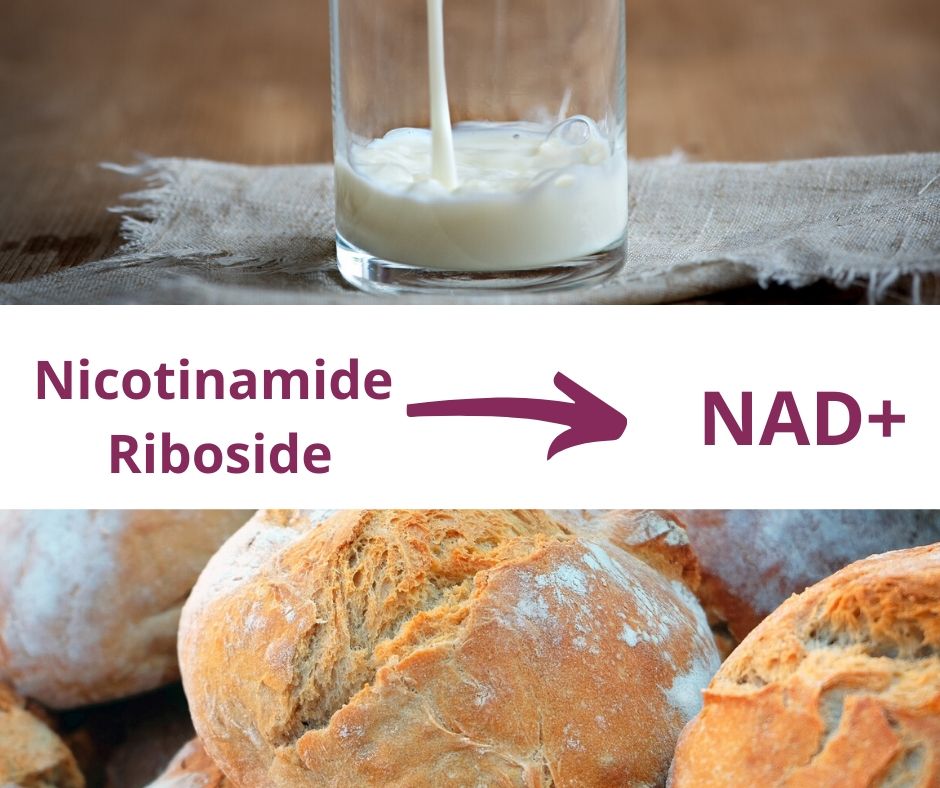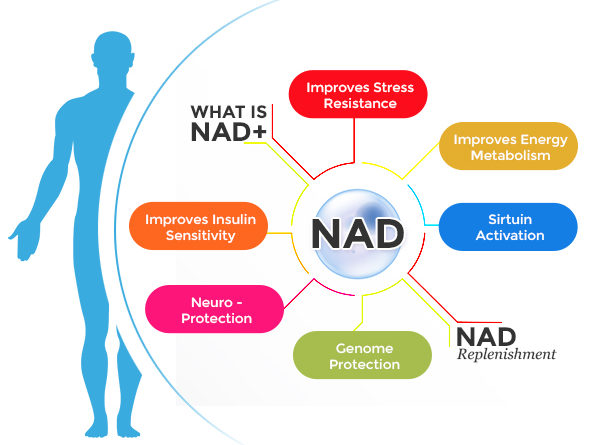Nicotinamide Riboside: Verified Fountain of Youth or Unnecessary Supplement?
There has been a ground swell in the popularity of nicotinamide riboside supplements in recent times. Understandably so, for it is purported to have anti-aging properties. But does it actually work? How? Has our relentless search for the ‘fountain of youth’ finally borne fruit, in molecular form? Before we answer these and more questions, let’s go back to the basics…
Key points:
- Nicotinamide riboside is a form of niacin (Vitamin B3) that is shown to be particularly effective at increasing NAD+ levels
- Supplementation may help reduce the DNA damage, inflammation and oxidative stress, and reductions in mitochondrial function associated with the drop in NAD+ levels with age
- Studies suggest supplementation with commercially available products would be safe in the short term (≤ 12 weeks)
- Further research is needed to be fully informed of the long-term efficacy and safety of supplements. Available evidence is limited by a heavy reliance on animal studies and small sample sizes.
What is nicotinamide riboside?
Nicotinamide riboside (or niagen) is one alternative form of niacin (vitamin B3). Niacin can be widely found in many foods, with good sources including tuna, mushrooms, green peas, peanuts, avocado, and- as most Aussie’s would know- vegemite. There are wide-ranging and well-documented benefits of having a sufficient niacin intake, such as cholesterol control.

The alternative forms of vitamin B3 have overlapping functions. The specific feature of nicotinamide riboside, responsible for its touted anti-aging properties, is the fact that it can be converted into nicotinamide adenine dinucleotide (NAD+). In truth, nicotinamide riboside isn’t the only form of vitamin B3 that can be converted into NAD+. However, it is possible that it raises the levels of NAD+ in the blood to a greater extent than others, and also that it is more readily used by the body. Seeing as there are numerous identified risk factors associated with excess niacin intake (ranging from itching to liver disease and diabetes), it would seem like a better choice to boost NAD+ through the more bioavailable nicotinamide riboside.
How does increasing NAD+ within your body slow aging?
NAD+ is a naturally-occurring coenzyme that is essential to many key chemical reactions and functions within your body. These include the electron transport chain that turns your acai bowl into energy to fuel your brain and workouts. NAD+ also aids the immune system, helps regulate circadian rhythms, and repairs damaged DNA.
It has been demonstrated that the amount of NAD+ within our bodies normally drops as we age, and is linked to the physical declines seen in aging as well as age-associated metabolic disorders, neurodegenerative diseases, and mental disorders. By increasing NAD+ through supplementation, perhaps we can prevent or attenuate the occurrence of these changes.

Studies purport the increased longevity and attenuated aging process is achieved through multiple means. There is encouraging evidence, for example, that higher NAD+ activates enzymes, such as sirtuin, which may repair DNA, reduce inflammation and the impacts of stress. NAD+ may also increase the production of PGC-1 alpha, which is a protective protein that can reduce oxidative stress and improve mitochondrial function within the brain. These two factors have been linked with conditions such as Alzheimers and Parkinsons. It may also reduce blood pressure and arterial stiffness. However, a majority of the evidence comes from animal studies or human research with inadequate sample sizes to draw definitive conclusions.
As a side note, NAD+ declines with age because it is destroyed by the enzyme CD38, which becomes more prominent during the aging process. It seems higher concentrations and activity of CD38 is prompted by inflammatory processes. Thus it is worth remembering that NAD+ may not be the culprit for aging, but rather an intermediary factor. Perhaps future anti-aging developments will investigate CD38 or inflammatory processes down the chain, to equal or greater success.
How much nicotinamide riboside is needed to obtain the benefits?
Nicotinamide riboside is found in foods including cows milk and yeast. However, as a trace nutrient it would be incredibly difficult to consume it in amounts that could provide the therapeutic effects suggested by research. Hence, this is a nutrient where supplementation may be valid.
Unfortunately, the question as to how much supplementation is required cannot be definitively answered as yet. There is an inadequate number of studies into the dose-response relationship. Of the available evidence, the validity of the results are limited by small sample sizes and a heavy reliance on animal studies. Watch this space…
Recent research suggests the efficacy of supplements could be altered by your gut health. First of all, it was observed that tumours contain microbes that produce an enzyme (PncA) that converts nicotinamide to nicotinic acid. This conversion feeds into another pathway that produces a significant amount of NAD+-… a pathway that human cells alone do not use. Secondly, mice with a diminshed microbiome (and therefore reduced capacity to use this pathway) produced substantially less NAD+ from nicotinamide riboside supplements. This apparent link between is an exciting discovery that should be further studied.
Is nicotinamide riboside supplementation safe?
To date, nicotinamide riboside supplementation appears to be safe, with doses of 1000-2000mg per day being well tolerated. However, it is important to note that we cannot know the long term effect and safety of the supplements, as studies examined have a duration of up to 12 weeks only. Some studies have found minor side effects such as nausea, fatigue, headaches, diarrhoea, stomach discomfort and indigestion reported.

Readily available commercial nicotinamide riboside supplements come in capsule and powder form, and generally provide between 100-300mg per dose. Based on the current evidence, this would appear safe. Despite potentially having greater benefits at higher doses, it is not advisable to go beyond the dose provided by a common supplement. Careful medical direction is imperative if you were to even consider taking doses similar to those seen in research- remembering that individual research participants’ responses to high doses were investigated under carefully controlled laboratory conditions, which reduces risk.
What about intravenous NAD+?
Today it is possible to get NAD+ delivered directly to the bloodstream (and then into cells) thanks to some international clinics offering IV NAD+. This bypasses the processes of digestion, absorption, and chemical conversion of nicotinamide riboside to NAD+ necessary for oral supplements. Sounds great, but there is a scarcity of evidence for the necessity of this. There are some studies- again using rodents- that have shown that delivering NAD+ directly through injections or through the nasal passages can protect against damage associated with strokes and treatments for heart attack. However, more investigation is needed into the other benefits of direct NAD+ supply, and preferably using humans. Studies comparing the efficacy of IV NAD+ supply and oral nicotinamide riboside supplements would also be valuable (they’re currently lacking). For now, it’s worth noting that in general, most healthy people without specific limitations don’t have difficulty in absorbing vitamins or converting them into other active molecules, in amounts adequate for their body.
There are also a number of other IV therapies on the market aimed at enhancing health.
The Verdict
Nicotine riboside does increase NAD+ levels. However, we need further research- in particular long term, well controlled studies using people. Then we’ll have more certainty on how well supplements may help reduce DNA damage, inflammation and oxidative stress, and reductions in mitochondrial function. It will also shed light on the long-term efficacy and safety of supplements.
Have you tried nicotinamide riboside supplements? How did you find it?
Airhart, S. E., Shireman, L. M., Risler, L. J., Anderson, G. D., Nagana Gowda, G. A., Raftery, D., Tian, R., Shen, D. D., … O’Brien, K. D. (2017). An open-label, non-randomized study of the pharmacokinetics of the nutritional supplement nicotinamide riboside (NR) and its effects on blood NAD+ levels in healthy volunteers. PloS one, 12(12), e0186459. doi:10.1371/journal.pone.0186459
Bose, A. and Beal, M. F. (2016), Mitochondrial dysfunction in Parkinson’s disease. J. Neurochem., 139: 216-231. doi:10.1111/jnc.13731
Demu, J.M. (2007).Vitamins and Aging: Pathways to NAD+ Synthesis. Cell. Volume 129, Issue 3, 4 May 2007,
Hill, S. (2018). Why NAD+ Declines With Age https://www.leafscience.org/nad-and-aging/
Jennings, K-A. (2018) 9 Science-Based Benefits of Niacin (Vitamin B3).https://www.healthline.com/nutrition/niacin-benefits
Johnson, S., & Imai, S. I. (2018). NAD + biosynthesis, aging, and disease. F1000Research, 7, 132. doi:10.12688/f1000research.12120.1
Raman, R. (2018) Nicotinamide Riboside: Benefits, Side Effects and Dosage https://www.healthline.com/nutrition/nicotinamide-riboside#bottom-line
Superfoodly (2018). Best Nicotinamide Riboside Food Sources. https://www.superfoodly.com/nicotinamide-riboside-food-sources/
Shats, I., Williams, J. G., Liu, J., et al. (2020). Bacteria Boost Mammalian Host NAD Metabolism by Engaging the Deamidated Biosynthesis Pathway. Cell metabolism. 31(3): 564–579.e7. https://doi.org/10.1016/j.cmet.2020.02.001
Trammell, S. A., Schmidt, M. S., Weidemann, B. J., Redpath, P., Jaksch, F., Dellinger, R. W., Li, Z., Abel, E. D., Migaud, M. E., … Brenner, C. (2016). Nicotinamide riboside is uniquely and orally bioavailable in mice and humans. Nature communications, 7, 12948. doi:10.1038/ncomms12948
Xi Chen, David Stern and Shi Du Yan, “ Mitochondrial Dysfunction and Alzheimers Disease”, Current Alzheimer Research (2006) 3: 515. https://doi.org/10.2174/156720506779025215
Zhang, Y., Wang, B., Fu, X., Guan, S., Han, W. , Zhang, J., Gan, Q., Fang, W., Ying, W., Qu, X. Exogenous NAD+ administration significantly protects against myocardial ischemia/reperfusion injury in rat model, Am J Transl Res 2016;8(8):3342-3350
Zhenga, C., Hanb,J., Xia,W., Shi, S., Liua, J., Yinga, W. (2012). ∗NAD+ administration decreases ischemic brain damage partially by blocking autophagy in a mouse model of brain ischemia. Neuroscience Letters 512, 67-71

I’m the co-founder of Evidently Healthy, the resident biohacker and a marketer’s dream. As someone who believes you can’t put a price on health. I’m passionate about improving lifespan and health span. In my spare time I enjoy traveling, snowboarding, diving, podcasts, exercise and eating in and out. #Coffee-Lover Rating global coffee bean for years..

Like!! Great article post.Really thank you! Really Cool.